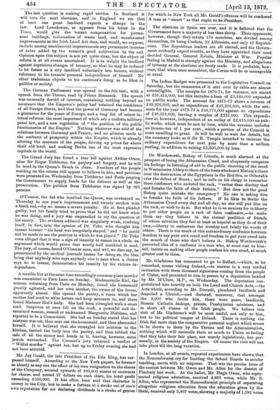Dr. Wordsworth, Bishop of Lincoln, is much alarmed at the
prospect of losing the Athanasian Creed, and eloquently compares his feelings in listening of old to the public chanting of the creed in Westminster Abbey to those of the hosts who heard Miriam's chant over the destruction of the Egyptians in the Red Sea, or Deborah's over the defeat of Sisera ; and he calls on his clergy to remember those confessors who endured the rack, "rather than disobey God and forsake the faith of their fathers." But does not the good Bishop quite mistake the emergency ? No one is asking hin. to forsake the faith of his fathers. If he likes to recite the Athanasian Creed every day and all day, no one will put him on the rack, or wish to do so. But what he is so anxious for is liberty to put other people on a rack of false confession,—to make them say they believe in the eternal perdition of friends of whose salvation they feel at least as hopeful as they do of their own,—liberty to embarrass the worship and falsify the words of others. There is too much of this extraordinary confusion between freedom to say your own creed and freedom to put your creed into- the mouth of those who don't believe it. Bishop Wordsworth's perverted idea of a confessor is a man who, at some cost to him- self, insists on making other people confess his own creed, at much greater cost to them.


































 Previous page
Previous page